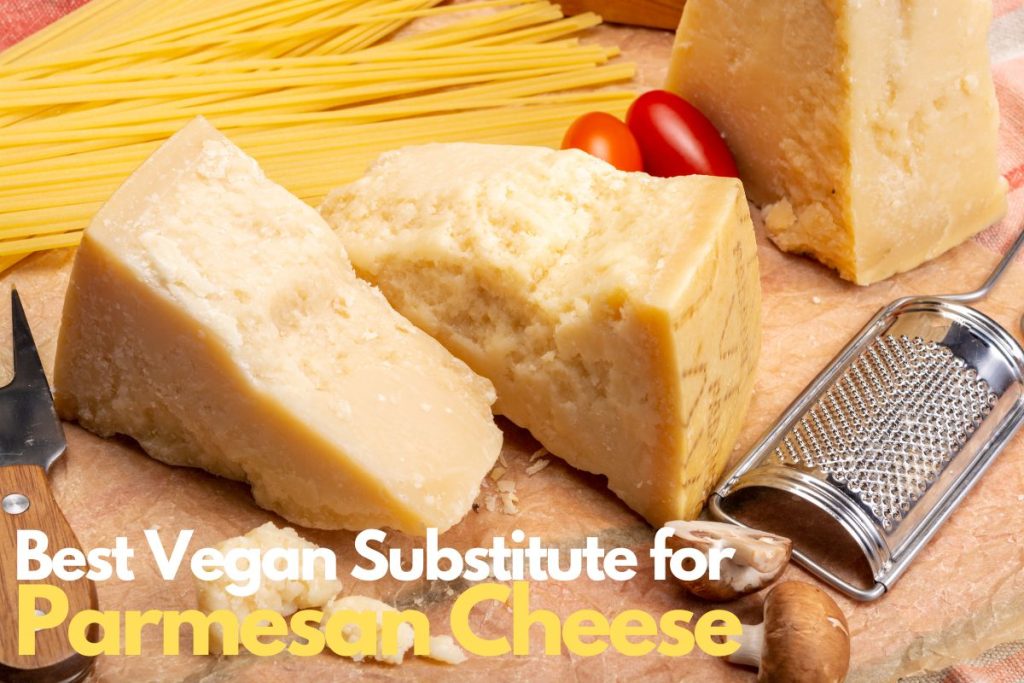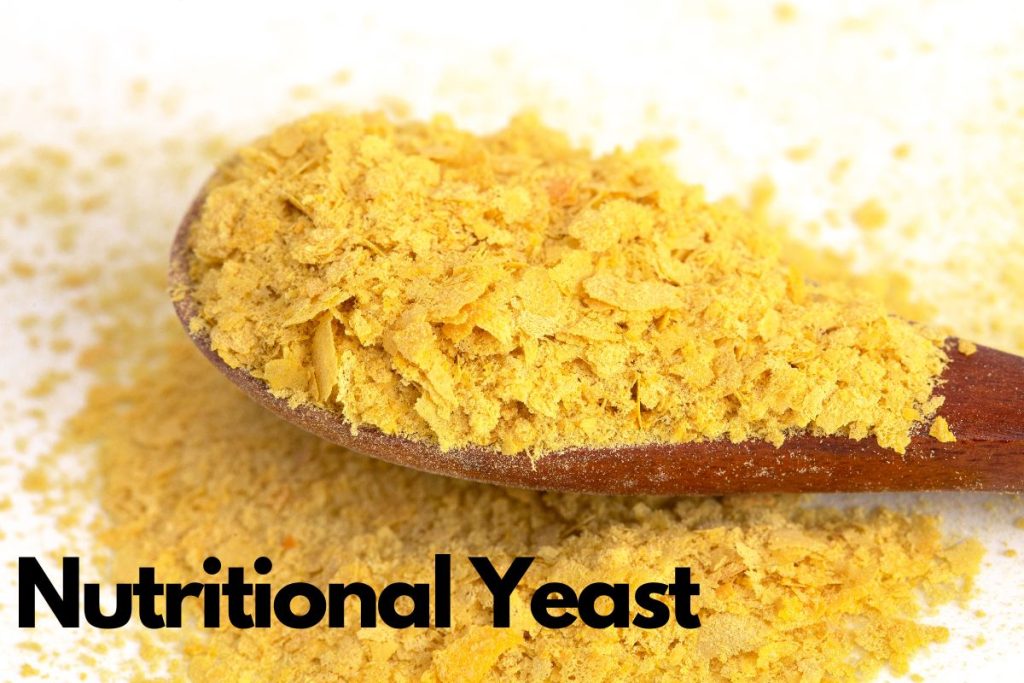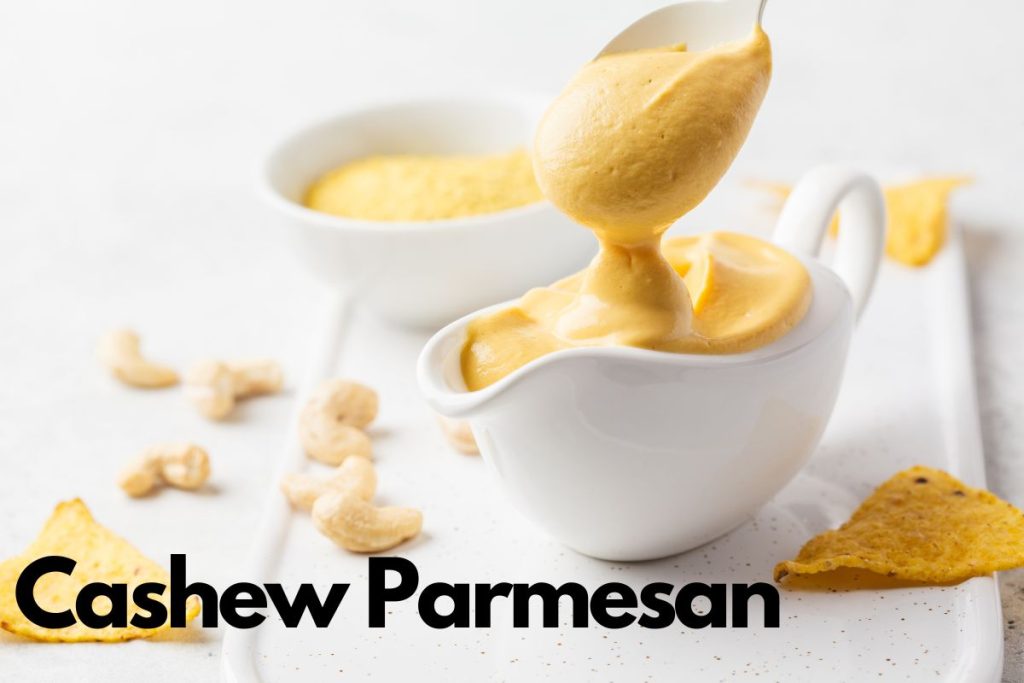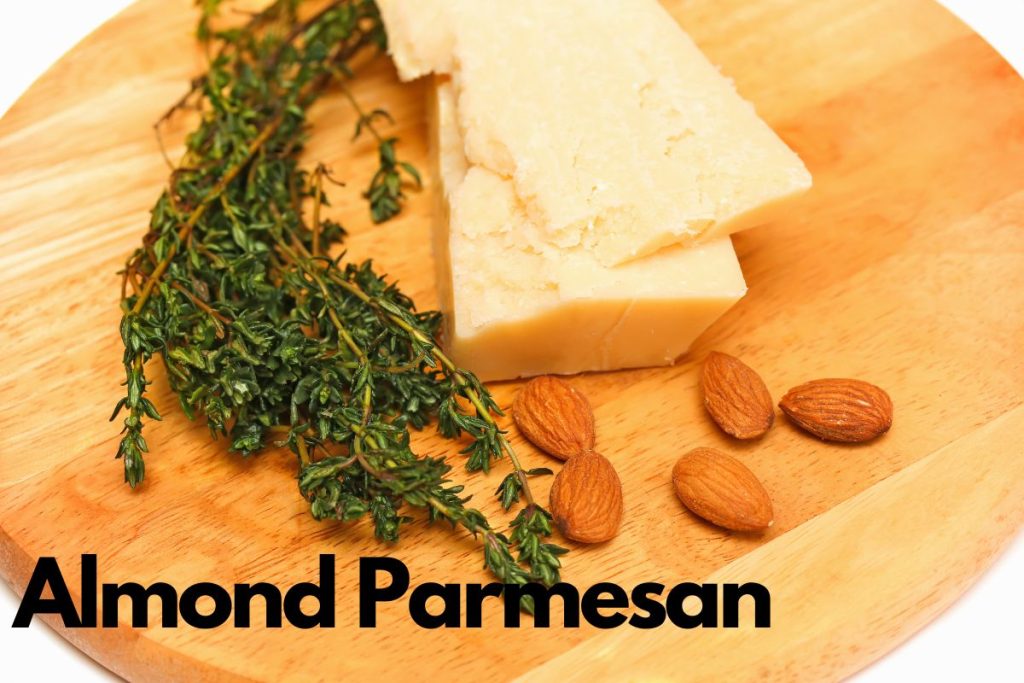Veganism, once considered a fringe movement, has now entered mainstream consciousness, with millions of people worldwide choosing to eliminate animal products from their diets.
This shift has led to a surge in demand for vegan substitutes to popular food items. One such item is Parmesan cheese.
Parmesan cheese, with its unique umami flavor and granular texture, is a staple in many traditional dishes, particularly those of Italian origin.
It’s used to add depth and richness to everything from pasta and risotto to salads and soups.
But for those following a vegan diet, traditional Parmesan cheese is off the table.
So, what’s a vegan to do when a recipe calls for Parmesan? The answer lies in finding a suitable vegan substitute.
In this article, we are going to explore the best vegan substitute for Parmesan cheese, why Parmesan cheese isn’t vegan and why you might want to find a vegan substitute.
We’ll also provide tips on how to use these substitutes in your recipes to achieve the best results.
So, let’s find the best vegan substitute for Parmesan cheese.
What is Parmesan Cheese?

Parmesan cheese, also known as Parmigiano-Reggiano, is a type of hard, granular cheese that originates from the Parma and Reggio Emilia regions of Italy.
It’s a highly valued cheese and is often called the “King of Cheeses” due to its unique flavor and texture.
The process of making Parmesan cheese is a labor-intensive one that requires skill, patience, and time. It starts with fresh, unpasteurized cow’s milk.
The milk is partially skimmed, mixed with natural whey starter and calf rennet, and heated until curds form.
These curds are then broken up, cooked, and pressed into wheels. The cheese wheels are brined and then aged for a minimum of 12 months, and often much longer.
During this aging process, the cheese develops its characteristic rich, nutty flavor and granular texture.
Why is Parmesan Cheese not Vegan?
Parmesan Cheese is made from milk, which is an animal derived ingredient.
Also, the use of animal rennet makes it unsuitable for vegans.
Rennet is an enzyme used in cheese making to coagulate milk and form curds. Traditional animal rennet is derived from the stomach lining of slaughtered young calves.
This clearly goes against the vegan principle of not using any products derived from animals.
The second issue is the source of the milk used to make Parmesan cheese.
Dairy farming involves practices that many vegans find ethically unacceptable, such as the separation of calves from their mothers shortly after birth and the slaughter of cows once their milk production declines.
Furthermore, the dairy industry is linked to environmental issues, including greenhouse gas emissions and water pollution.
For these reasons, Parmesan cheese is not considered vegan. But that doesn’t mean vegans can’t enjoy the rich, umami flavor that Parmesan adds to dishes.
In the next section, we’ll explore why someone might seek out vegan substitute for Parmesan cheese and what options are available.
Why Look for Vegan Substitute for Parmesan Cheese?
-Ethical Reasons
One of the primary reasons people choose a vegan lifestyle is out of concern for animal welfare.
The production of animal-based foods, including dairy and cheese, often involves practices that many people find ethically unacceptable.
These can include the confinement of animals in crowded conditions, the separation of young animals from their mothers, and the slaughter of animals for meat or when their productivity declines.
By choosing vegan substitutes, individuals can enjoy the flavors and textures they love without contributing to these practices.
-Health Reasons
Another reason people choose vegan substitutes is for health reasons.
Plant-based diets are often lower in saturated fat and cholesterol than diets that include animal products, and they can be higher in fiber and certain nutrients.
For some people, choosing vegan substitutes can be part of a strategy to manage health conditions like heart disease or high cholesterol, or to support overall wellness.
-Environmental Reasons
The production of animal-based foods is also a significant contributor to environmental issues.
This includes greenhouse gas emissions, water pollution, and land degradation.
Dairy production, in particular, is resource-intensive, requiring large amounts of water and land.
By choosing vegan substitutes, individuals can help reduce the environmental impact of their diet.
-Allergies or Intolerances
Some people may also choose vegan substitutes because of allergies or intolerances to dairy products.
Lactose intolerance, in particular, is a common condition that can cause digestive symptoms in people who consume dairy products.
Vegan substitutes can provide a way for these individuals to enjoy the flavors and textures of foods they might otherwise have to avoid.
In the next section, we’ll explore some of the best vegan substitute for Parmesan cheese, considering these factors.
Top Vegan Substitute for Parmesan Cheese
Finding a vegan substitute for Parmesan cheese that replicates its unique flavor and texture can be a challenge, but it’s not impossible.
There are several plant-based alternatives that can provide a similar umami kick and a pleasing texture. Let’s explore some of the top options.
1-Nutritional Yeast

Nutritional yeast is a deactivated yeast that is a popular cheese substitute among vegans.
It’s sold in the form of flakes or powder and has a nutty, cheesy flavor that makes it a great substitute for Parmesan.
Nutritional yeast is also a nutritional powerhouse, packed with B vitamins, protein, and fiber.
You can sprinkle it on top of pasta, pizza, salads, or any dish where you would typically use Parmesan cheese.
2-Cashew Parmesan

Cashew Parmesan is another excellent vegan substitute for Parmesan cheese.
It’s made by blending raw cashews with nutritional yeast, garlic powder, and salt in a food processor until it reaches a fine, crumbly texture.
The result is a cheesy, savory topping that you can use in a variety of dishes.
Plus, cashews are a good source of healthy fats, protein, and minerals, making this a nutritious alternative.
3-Almond Parmesan

Almond Parmesan is similar to cashew Parmesan but is made with almonds instead of cashews.
The process is the same: blend raw almonds with nutritional yeast, garlic powder, and salt until you get a fine, crumbly mixture.
Almond Parmesan has a slightly different flavor profile than cashew Parmesan, with a hint of nuttiness from the almonds.
It’s a great source of vitamin E, healthy fats, and protein.
4-Store-Bought Vegan Parmesan
If you prefer convenience, there are also several store-bought vegan Parmesan cheeses available.
These products are often made from a blend of ingredients like nuts, nutritional yeast, and seasonings to replicate the flavor and texture of Parmesan cheese.
Some popular brands include Follow Your Heart, Go Veggie, Nooch IT and Violife.
Each of these vegan substitutes for Parmesan cheese has its own unique qualities and can bring something different to your dishes.
The best one for you will depend on your personal taste preferences, dietary needs, and cooking habits.
In the next section, we’ll provide some practical tips for using these vegan substitutes in your recipes.
How to Use Vegan Parmesan Cheese Substitutes in Recipes
Now that we’ve explored some of the best vegan substitutes for Parmesan cheese, let’s discuss how to use them in your recipes effectively.
When using vegan Parmesan substitutes in your recipes, there are a few things to keep in mind to achieve the best results.
Consider the Flavor Profile:
Each vegan Parmesan substitute has its own unique flavor profile.
Nutritional yeast has a nutty, cheesy flavor that can enhance a variety of dishes. Cashew and almond Parmesan have a nutty undertone that can add depth to your recipes.
Store-bought vegan Parmesan cheeses can vary in flavor depending on the brand and ingredients used. Choose a substitute that complements the other flavors in your dish.
Adjust the Quantity:
You may need to adjust the quantity of the vegan Parmesan substitute you use in your recipe.
As a general rule, you can substitute vegan Parmesan for dairy Parmesan in a 1:1 ratio.
However, because vegan Parmesan substitutes can have a stronger flavor than dairy Parmesan, you may need to use less to avoid overpowering your dish.
Add at the Right Time:
Vegan Parmesan substitutes, particularly nutritional yeast, can lose some of their flavor when cooked for long periods.
To preserve their flavor, add them towards the end of the cooking process or use them as a garnish.
Experiment:
Don’t be afraid to experiment with different vegan Parmesan substitutes to find the one that works best for you.
Each one has its own unique properties and can bring something different to your dishes.
Final Thoughts:
Going vegan doesn’t mean you have to give up the flavors and textures you love.
With a bit of creativity and a willingness to experiment, you can find vegan substitutes for almost any ingredient, including Parmesan cheese.
Nutritional yeast, cashew Parmesan, almond Parmesan, and store-bought vegan Parmesan cheeses are all excellent alternatives that can provide the umami kick and pleasing texture that Parmesan cheese brings to dishes.
Each has its own unique qualities, and the best one for you will depend on your personal taste preferences, dietary needs, and cooking habits.
Remember, the key to successful vegan cooking is understanding the properties of your ingredients and how they interact with each other.
Vegan Parmesan cheese substitutes may not behave exactly like dairy Parmesan in recipes, but with a little knowledge and creativity, you can adapt your recipes and create delicious, vegan-friendly dishes.
Finally, keep in mind that choosing vegan substitutes is about more than just food. It’s a lifestyle choice that reflects a commitment to animal welfare, health, and environmental sustainability.
By choosing vegan substitutes for common ingredients like Parmesan cheese, you’re not only creating delicious food, but you’re also making a positive impact on the world.
So, the next time you’re whipping up a recipe that calls for Parmesan cheese, why not try a vegan substitute? You might be surprised by how easy it is to make the switch, and how delicious the results can be.
